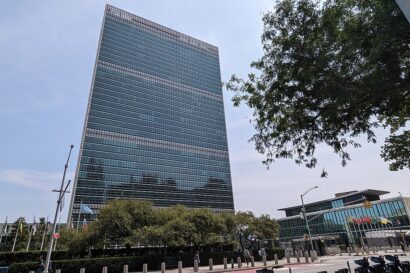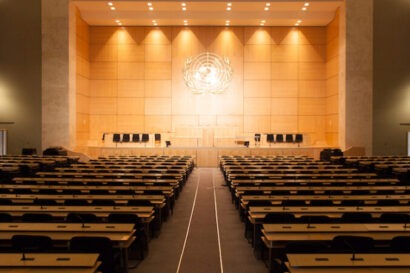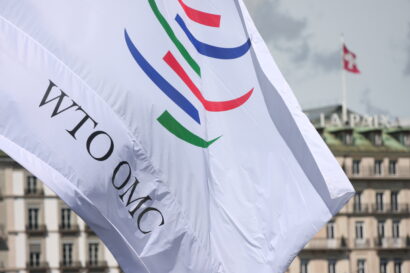The negotiations on ‘Pillar One’ at the G20/OECD Inclusive Framework have shown quite how much effort governments are willing to devote to a negotiation the outcome of which may never come into effect. After attending negotiations on the United Nations Framework Convention on Tax earlier this month, I have been thinking about how to ensure that this is not the case for the new Convention.
There were many familiar faces from ICTD’s work on tax policy in African countries, and from studying negotiations in the Inclusive Framework (pictured). But the setting was different: an intergovernmental negotiation at the UN. This was the first round of substantive discussions on the Terms of Reference (TOR) for the Convention, which will guide negotiations on the Convention itself over the next few years. It was an open-ended discussion, whereas in the second round of talks in July and August this year countries will need to settle on the TOR that will be sent to the General Assembly for adoption.
Last year, the Secretary General’s report set out a definition of “inclusive and effective” tax cooperation, which is closely aligned to the three types of legitimacy that my colleagues and I have used elsewhere. These are input legitimacy (who has a say), throughput legitimacy (‘procedural criteria’ in the Secretary General’s report, comprising participation, agenda-setting, decision-making and implementation) and output legitimacy (uptake and utility of the end product, or ‘substantive criteria’ in the report). There is no question that the UN has input legitimacy, but throughput and output considerations are both very alive in the uncertainty about the outcome of the Convention negotiations, and its ultimate relevance and impact.
Throughput legitimacy (1): participation
These negotiations have a different feel to those in the UN committee of experts and (I assume) the OECD, and one reason for this is no doubt that the setting involves ministries of foreign affairs in addition to the usual tax technocrats. Yet, much like in those other spaces, higher-income countries seem better equipped to deploy a combination of socio-technical capacity and official governmental backing. A greater proportion of OECD countries were represented in the day-to-day discussions than others, and they were more likely to have multiple people present.
Considering first the tax experts, it seemed that a majority of those active in the discussion had also participated in other international tax bodies such as the Inclusive Framework, a background that offered a certain amount of social capital, technical authority and a rapport with other delegates. This was obviously true for the participants from higher-income countries, but also for some from the global South. Many of the most compelling interventions supporting an ambitious UN Convention came from delegates who had considerable experience within the Inclusive Framework.
In principle, the ability to rely on New York-based diplomats should place negotiations on a more equal footing, because lower-income countries do not need to fly in tax officials from capitals at a great cost in terms of cash and time, not to mention inequalities over visa requirements. Yet there is also a disparity in capabilities. A country with fewer staff in its UN mission cannot follow every negotiation taking place in parallel in as much depth, nor will those delegates have the time to develop the issue-specific knowledge that will be essential once negotiations move into policy content – though this is in principle how they need to work. Perhaps more importantly, strict lines of communication within many global South governments can make it harder for diplomats in New York to communicate informally with finance ministry officials back home when they need technical backstopping. When it comes to a vote, the global South bloc has the numbers. But, as we found when we studied the Inclusive Framework, much of the decision-making takes place in the technical discussions between the set piece plenaries.
To make the negotiations more inclusive there were proposals to provide technical training to UN mission staff, offer lower-income countries funding for travel costs, ensure timely and comprehensive translation of documents, and rotate the location of negotiations. Each of these may help. But in addition, it is essential that the global South continues to work as Africa is already doing so effectively: through coalitions, represented by skilled and experienced negotiators from among their members, and increasingly combining technical and political organisations.
Throughput legitimacy (2): decision-making
The committee is striving to reach consensus where possible, but on the more contentious topics most members’ positions tended to fall into two fairly entrenched blocs. There were of course exceptions – small island states, and countries from the global South that are also members of the OECD. If attempts to reach consensus are exhausted, the negotiating committee will default to majority decision-making, where it seems the global South will hold sway. So far the most divisive splits are over principle, process and institutional design. In particular:
- How should the convention relate to existing – especially OECD – institutions? Should the principle be one of ‘complementarity’ that avoids overlaps, or ‘consolidation’ into one overarching UN framework?
- Should decisions during the convention negotiations be taken by majority, supermajority, or consensus? And what does it mean to have exhausted efforts to reach consensus?
- Should states agree protocols at the same time as they negotiate the overall framework, or should they wait to have it in place first?
It leaves the global South bloc with a strategic choice. Yes, they have the numbers and the resolve to force through decisions about the convention and its protocols without OECD support. Experience at the Inclusive Framework implies that trying to maintain consensus within a grand coalition from all parts of the world can be impractical, leading to complex and drawn-out deliberations. This will be especially the case on distributional policy questions where there is an element of zero-sum outcome. But, conversely, not all policy problems can be solved by a majority of countries acting against the will of a powerful minority. My view is that a successful framework convention would include both majority and consensus protocols from the outset, setting the precedent for these two modes of cooperation.
Throughput legitimacy (3): agenda-setting
As I left the meeting, discussion was continuing about the early protocols that might be negotiated alongside the Convention. Three things stood out to me in this discussion. First, this was the work of agenda-setting happening out in the open on an equal footing, already a distinctive characteristic of the Convention. Second, there is a huge distance to travel from a list of topics (cross-border services, taxation of the wealthy, etc) to a clear notion of what specifically a protocol to the UN Convention on each topic would be designed to achieve. I think that will be a much bigger challenge than the discussions on the framework itself. Third, I think it’s essential to have those discussions now, so that some policy objectives begin to crystallise before the institutional design is finalised. The form of the Convention should be based on an idea of the kinds of policy outcomes it is designed to achieve, and on this I have not yet heard much clarity.
Output legitimacy: will the outcomes be useful?
Of course, countries that do not support a decision may still implement it. As African and small island states reminded their OECD counterparts repeatedly in New York, we are already in a world where a powerful minority has been able to persuade a large part of the majority to comply with standards that they did not formulate and may not consider appropriate, including through explicit coercion in the case of the EU blacklist. Dare I say it, the global South has also succeeded in coercing the OECD countries into a negotiation that they opposed in the General Assembly. If lower-income countries move in lockstep on business taxation, others may face pressure from their multinationals to participate in order to minimise double taxation.
Conversely, countries that sign up to an agreement may not implement it. Whether we look at VAT, corporate tax or exchange of information provisions, the global South does not, as a whole, move swiftly to align its domestic law with international standards. This is true even when those standards are embodied in intergovernmental conventions. For example, almost eight years after the Multilateral Convention to Implement Tax Treaty Related Measures to Prevent BEPS (MLI) was concluded by an ad hoc group of around 100 jurisdictions, it is in force in only nine out of 54 African countries. Several others, including Kenya and Nigeria, signed it soon after it was concluded but have yet to ratify it.
Of course, some of the blame for this lies with the standards themselves, many of which are complex and costly to adopt, or lacking in relevance to lower-income countries’ needs. The potential benefits to lower-income countries from the MLI are quite limited. It’s not necessarily a bad thing if governments’ attention is focused on other aspects of tax policy and administration that are more pressing priorities.
Yet, the dynamics within governments can also undermine their implementation of important commitments, if political support is hard to obtain once agreement has been reached at official level, or conversely if political commitments are made without appreciation of the technical groundwork needed before they can be implemented.
This poses a risk for the UN Convention. How can it gain traction on the ground, as well as in New York? Regional organisations including the African Union, African Tax Administration Forum, and the Platform for Taxation in Latin America and the Caribbean are doing important work to build political awareness of the Convention among their members, and the involvement of foreign ministry staff in UN missions will also help. Yet, I think a lesson from the Inclusive Framework (and perhaps also the current UN committee of experts) is that it is hard to parachute new tax policy into large numbers of countries from above through a multilateral agreement, even if their officials have had a hand in negotiating it. The ‘low hanging fruit’, at least, is likely to be found in standardising things that a critical mass of countries are already doing, or actively considering. For example, I find the idea of a digital services tax protocol quite attractive: there is strong interest from policymakers in lower-income countries, but few countries want to act alone; there’s some country experience on which to draw; there is no international consensus on the best approach, but rather a menu of options; there is a clear advantage to an intergovernmental agreement that would allow for double taxation relief – though it would be unlikely to have the immediate support of all home countries of multinationals supplying digital services. This brings me back to my agenda-setting point. Identifying tangible short- and medium-term gains, as well as long term objectives for international tax reform, will be critical if the convention is to play a major role in the international tax landscape.




